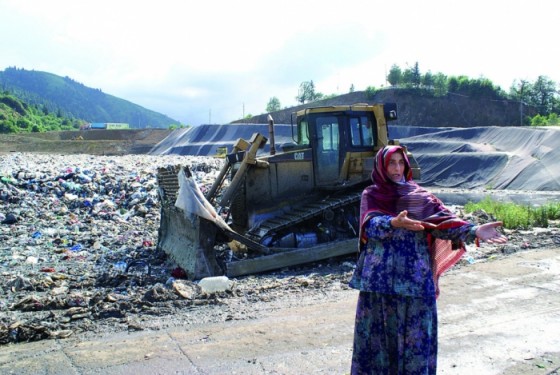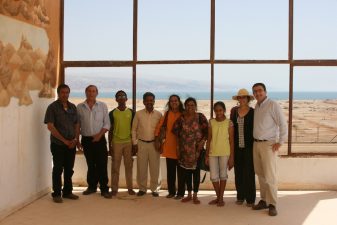 Polluting Paradise, the latest film by Turkish-German director Fatih Akin, documents the disgusting damage caused by a garbage dump near the Black Sea village of Çamburnu.
Polluting Paradise, the latest film by Turkish-German director Fatih Akin, documents the disgusting damage caused by a garbage dump near the Black Sea village of Çamburnu.
Ten years ago, Turkish government authorities decided to transform an abandoned copper mine in northeastern Turkey into the biggest landfill in the eastern Black Sea region. Despite promises that the waste would be carefully contained, it began leaching into the surrounding soil, water, and air almost immediately. From the beginning, the nearby fishing and tea-cultivating village of Çamburnu has mounted a strong opposition to the development.
Since it began to be filled, pervading the air with a terrible stench and turning local streams brown and foamy, the locals have grown more desperate.
At stake is not only their pristine environment — the pure air, verdant forests, and bountiful rivers of the lush Black Sea mountains — but the very livelihood of the town. Çamburnu’s economy is based on exporting tea and fish to the rest of the country. Spoil those resources, and the village’s 1,7000 residents are out of work.
While the village’s mayor and lawyers filed suits against the dump, locals argued with the dump overseer, blocked bulldozers’ access to it, and tried to bring the situation to the attention of their detached provincial governor. They pointed out that the canvas lining was clearly leaking, that the region’s torrential rains periodically overflowed the dump, and that a wall supposed to hold in the rubbish had fallen down.
Most scenes in the film feature spirited villagers squaring off against government officials or dump workers. In one scene, a spunky older woman confronts an uncomfortable official about the dump, shouting, “I don’t pray for forgiveness from my sins anymore, I just pray that Allah saves us from the garbage!”
Notable examples of opposition movements in Turkey include the 10,000 people who protested a coal-fired power plant in Gerze last November, the movement to prevent the park in Istanbul’s main square from being built over, and the deforestation documentation project led by Turkey’s “environmental grandfather”, Hayrettin Karaca, which may send him to prison.
Window into Black Sea life
Polluting Paradise is more than just an environmental documentary. Several segments of the film draw away from the depressing effects of the dump to snapshot everyday life in the Turkish Black Sea region.
One fascinating sequence shows the process of manufacturing tea, from its harvesting in the field to the Rube-Goldberg-like apparatus that cleans, shreds, dries and packages it. Another scene follows a farmer as he pauses from his work in the fields, runs down to the mosque, and sings the call to prayer through a microphone plugged into the wall.
Less bucolic aspects of life in Çamburnu are also explored. Like most small Turkish towns, the village’s population is dwindling as more young people move to bigger cities for education and work. Akin traces this thread through interviews with several teenage residents of the village. And a hint of the patriarchal system that still dominates rural Turkish culture comes through when the women laughingly explain that they do most of the harvesting work because their men “claim a right to be lazy.”
The film’s biggest weakness is its over-reliance on dramatic scenes and effects — panning shots of the landfill as sinister music swells in the background, shouting matches between villagers and officials — and its patchy explanation of the legal battle against the dump.
It isn’t clear which office in Turkey’s central government authorized the dump in the first place, or who has the power to close it now. The film ends with the mayor’s abrupt declaration that they have lost all the lawsuits they filed. In a country with as many local environmental movements as Turkey, the finer points of Çamburnu’s deserve to be hammered out.
Some scenes, particularly those involving children, also feel a bit staged — as though the kids are parroting lines or retorts about the plant that they have been taught.
A personal connection
Akin’s father’s family is from Çamburnu, but he first came to the region in 2007 while shooting Edge of Heaven.
The story Akin stumbled upon is just one of many environmentally disastrous developments occurring around Turkey, promoted by private corporations and central government but opposed by locals who actually have to live with the consequences.
Despite its flaws, Polluting Paradise is a welcome contribution to Turkey’s sparse history of environmental documentaries. Hopefully it will inspire other filmmakers to return to their hometowns and check in on the welfare of the local environment. It may be more threatened than they think.
Read more about local environmental movements in Turkey:
As He Battles Lawsuit, Grandfather of Turkish Environmental Movement Receives Right Livelihood Award
Istanbul’s Main Square To Become Lifeless And Isolated In New Urban Plan, Opponents Warn
10,000 Turks Gather To Protest Coal-Fired Power Plant
“Anatola Won’t Be Blackened” Declare Turkish Anti-Fossil Fuel Groups


